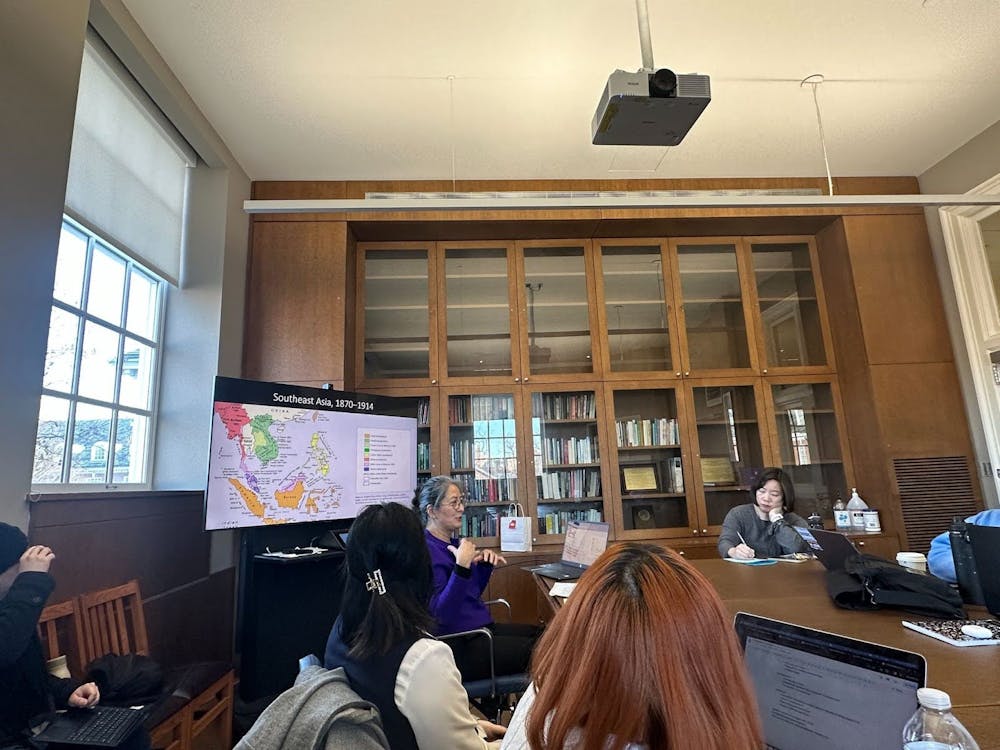The East Asian Studies Program held an event titled “Immobilization and Decolonization in Singapore, 1945–1953” on Tuesday, Feb. 20 as part of the East Asian Studies Speaker Series. The event featured Madeline Hsu, a professor of history and director of the Center for Global Migration Studies at the University of Maryland College Park.
In an email to The News-Letter, H. Yumi Kim, co-organizer of the event and assistant professor of history at Hopkins, shared why Hsu was chosen as a speaker for this event.
“Dr. Hsu is a renowned historian of immigration and transnational migrations,” she wrote. “We wanted to give students and faculty a chance to learn more about societies in Southeast Asia, a part of the world that is not usually studied at Hopkins. The region’s entangled histories of colonialism, migration and trade can tell us so much about global forces that have shaped everyday lives.”
Hsu shared insights from her latest research on Singapore and Malaya, which includes several states that were under British rule and later on became Malaysia. The research is a comparative project informed by her expertise in U.S. immigration history, and she is particularly interested in examining the institutionalization of migration and citizenship regulations.
“I am interested in Singapore for a number of reasons, because it also presents itself as a multiracial democracy,” she said. “[Singapore is] produced out of significantly different immigration flows [than the U.S. and is] also very differently located with regard to its relationship to the British empire.”
The speaker explained that Singapore was a strategically important location for British imperialism, because it provided access to trade routes through the Malacca Straits. As a result, the British exercised immigration policies that caused large numbers of Chinese people to migrate to Singapore and Malaya from 1851 until World War II.
“Singapore very quickly boomed into this chief funnel for Chinese migration into Malaya,” she said.
Hsu described that British imperial governance was light-handed. The British operated with as little administrative structure as possible, which was done by strategically keeping ethnic groups separate and subjecting Malay, Chinese and Indian populations to different laws.
In an interview with The News-Letter, Leyra Espino-Nardi, a junior studying East Asian Studies and History, shared that she found the effects of “light-handed” British governance interesting.
“Despite their ‘light-handedness,’ there are still really similar effects historically, in terms of social stratification, social order, social practices and social norms, to other former British colonies,” she said.
Hsu’s research focused on decolonization in Singapore between 1945 and 1957. According to the speaker, the British set Malaya and Singapore on paths to independence in 1945, but citizenship was first granted in Singapore in 1957. Between these 12 years, the British imposed strict regulation of immigration and citizenship as a prerequisite to Singapore’s independence.
After 1945, the British faced challenges as they granted Malaya independence, including issues of territoriality and integration. Although the percentages of Chinese, Indians and Malays peoples in Malaya were similar, Malays claimed indigeneity and perceived that the Chinese and Indian populations had not integrated.
Additionally, the speaker noted that the Chinese and Indian populations benefited from preferential economic access under British imperial rule. The British kept the Malay population working in agriculture, while the Chinese and Indian populations had opportunities in mining, the plantation economy and commerce.
“So [there were] lots and lots of tensions,” she said. “The presumption was that people will vote and the politics will be shaped by communalism or ethnic politics, as opposed to this concept of communitarianism, which is that the different groups can actually act together and identify shared interests.”
Hsu pointed out that in the 1920s, Chinese migration into Singapore increased, reaching 75% of the Singaporean population. Through its immigration policy, Singapore has maintained this percentage ever since.
According to the speaker, the main reason for British decolonization of Singapore was the rapidity with which Japan took over Malaya and Singapore in 1942. The British then developed a plan for an independent Malayan Union with common citizenship. However, the plan, which was implemented in 1948, was created without consultation from the Chinese or Indian populations.
To obtain common citizenship in the Malayan Union, one had to have a parent born in Malaya, be a long-term resident of Malaya and meet a language requirement of speaking either Malay or English.
“The language criteria really eliminated a lot of long-term residents of Malaya,” she said. “In comparison, the Singapore system is much more accessible. If you’re a British subject by local birth or naturalization, you don’t have to qualify across multiple generations.”
In an interview with The News-Letter, Naiyah Brown, a senior studying Chemical and Biomolecular Engineering, expressed their interest in how previous colonial structures affected citizenship-building in Singapore and Malaya.
“One notion we talk about a lot in class is path dependency,” they said. “[Path dependency is] how citizenship and nation-building are dependent on the previous colonial and imperial structures that defined their government and relationship with other countries in East Asia.”
After 1948, another colonial immigration policy restricting admission into Singapore was implemented, leading to what Hsu called “immobilization.” This policy allowed only those related to legal residents and some skilled workers to enter Singapore.
“In October 1948, [the colonial administration] sharply limited, scrutinized and checked who wanted to gain admission into Singapore,” Hsu said. “For new immigrants, this is a form of immobilization. You have to come, you have to stay, you have to claim your local status.”
Brown commented that the talk gave them further insight into the impacts of immigration systems on minorities.
“As an American, my first instinct is how democracy, in theory, and sometimes in practice, is really great at governing a nation in a way that is most favorable to the most number of people,” they said. “But it becomes very complicated when you have indigenous minorities who are pushed out by the implementation of these systems.”





